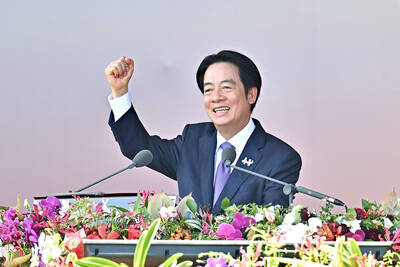The Presidential Office yesterday defied a court ruling that required the surrender of documents relating to President Chen Shui-bian's (
The Taipei District Court on Friday ordered the Presidential Office to submit the documents by noon yesterday. The court had rejected a request that documents relating to secret diplomatic activities be seized.
The Presidential Office sent a letter to the court yesterday explaining why it would not comply.
Presidential Office Deputy Secretary-General Liu Shih-fang (劉世芳) said the Presidential Office would not comply with the court's ruling because the request had been made to the Presidential Office rather than the president.
"The president is the head of state and commander-in-chief. It is the president's authority to determine which diplomatic mission is confidential," Liu said. "Presidential Office Secretary-General Mark Chen (陳唐山) cannot respond to the court's request on behalf of the president because he is in charge of the operations of the Presidential Office."
In any case, Liu added, secret diplomatic projects sometimes did not involve documentation and agents involved were not necessarily Taiwanese nationals.
"As the president said, some of the secret diplomatic projects must remain secret forever and go with him to his grave," she said.
If the court demanded that Chen comply or summon him for questioning, Liu said this might violate Article 52 of the Constitution, which gives immunity to the president except in case of sedition or treason.
Liu said the Presidential Office had turned over all the documents it could and that it was up to Chen to decide on the rest.
On whether first lady Wu Shu-jen (吳淑珍) would appear in court tomorrow, Liu said the Presidential Office would abide by the opinion of her medical team.
Wu was indicted on corruption and forgery charges over Chen's alleged misuse of the controversial "state affairs fund."
She has been staying at National Taiwan University Hospital since Dec. 15, when she nearly collapsed during the first session of her trial.
The Democratic Progressive Party (DPP) legislative caucus has requested that the Council of Grand Justices rule on the constitutionality of prosecutors questioning the president.
The Taipei District Court ruled last Friday that prosecutors did not violate the Constitution in doing so and that Wu's trial should continue.

The Ministry of the Interior (MOI) is to tighten rules for candidates running for public office, requiring them to declare that they do not hold a Chinese household registration or passport, and that they possess no other foreign citizenship. The requirement was set out in a draft amendment to the Enforcement Rules of the Public Officials Election and Recall Act (公職人員選舉罷免法 ) released by the ministry on Thursday. Under the proposal, candidates would need to make the declaration when submitting their registration forms, which would be published in the official election bulletin. The move follows the removal of several elected officials who were

FOUR DESIGNATED AREAS: Notices were issued for live-fire exercises in waters south and northwest of Penghu, northeast of Keelung and west of Kaohsiung, they said The military is planning three major annual exercises across the army, navy and air force this month, with the navy’s “Hai Chiang” (海強, “Sea Strong”) drills running from today through Thursday, the Ministry of National Defense said yesterday. The Hai Chiang exercise, which is to take place in waters surrounding Taiwan, would feature P-3C Orion maritime patrol aircraft and S-70C anti-submarine helicopters, the ministry said, adding that the drills aim to bolster the nation’s offshore defensive capabilities. China has intensified military and psychological pressure against Taiwan, repeatedly sending warplanes and vessels into areas near the nation’s air defense identification zone and across

SENATE RECOMMENDATION: The National Defense Authorization Act encourages the US secretary of defense to invite Taiwan’s navy to participate in the exercises in Hawaii The US Senate on Thursday last week passed the National Defense Authorization Act (NDAA) for Fiscal Year 2026, which strongly encourages the US secretary of defense to invite Taiwan’s naval forces to participate in the Rim of the Pacific (RIMPAC) exercise, as well as allocating military aid of US$1 billion for Taiwan. The bill, which authorizes appropriations for the military activities of the US Department of Defense, military construction and other purposes, passed with 77 votes in support and 20 against. While the NDAA authorizes about US$925 billion of defense spending, the Central News Agency yesterday reported that an aide of US

NATIONAL DAY: The ‘Taiwan Dome’ would form the centerpiece of new efforts to bolster air defense and be modeled after Israel’s ‘Iron Dome,’ sources said President William Lai (賴清德) yesterday pledged to strengthen the nation’s air defense capabilities and build a “T-Dome” system to create a safety net against growing military threats from China. “We will accelerate our building of the T-Dome, establish a rigorous air defense system in Taiwan with multi-layered defense, high-level detection and effective interception, and weave a safety net for Taiwan to protect the lives and property of citizens,” he said in his National Day address. In his keynote address marking the Republic of China’s (ROC) 114th anniversary, Lai said the lessons of World War II have taught nations worldwide “to ensure that